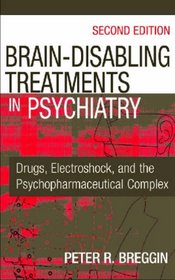Search -
Brain Disabling Treatments in Psychiatry: Drugs, Electroshock, and the Psychopharmaceutical Complex
Brain Disabling Treatments in Psychiatry Drugs Electroshock and the Psychopharmaceutical Complex
Author:
From the author of Toxic Psychiatry and Talking Back to Prozac: — "Peter Breggin is the conscience of American psychiatry. Once more he updates us on the real evidence with respect to the safety and effectiveness of specific psychiatric medications and ECT. This information is needed by all mental health professionals, as we... more »
Author:
From the author of Toxic Psychiatry and Talking Back to Prozac: — "Peter Breggin is the conscience of American psychiatry. Once more he updates us on the real evidence with respect to the safety and effectiveness of specific psychiatric medications and ECT. This information is needed by all mental health professionals, as we... more »
ISBN-13: 9780826129345
ISBN-10: 082612934X
Publication Date: 12/17/2007
Pages: 320
Edition: 2
Rating: ?
ISBN-10: 082612934X
Publication Date: 12/17/2007
Pages: 320
Edition: 2
Rating: ?
0 stars, based on 0 rating
Publisher: Springer Publishing Company
Book Type: Hardcover
Members Wishing: 0
Reviews: Amazon | Write a Review
Book Type: Hardcover
Members Wishing: 0
Reviews: Amazon | Write a Review
Genres:
- Health, Fitness & Dieting >> Psychology & Counseling >> Adolescent Psychology
- Health, Fitness & Dieting >> Psychology & Counseling >> Child Psychology >> Psychology
- Health, Fitness & Dieting >> Psychology & Counseling >> Clinical Psychology
- Health, Fitness & Dieting >> Psychology & Counseling >> Neuropsychology
- Health, Fitness & Dieting >> Psychology & Counseling >> General
- Health, Fitness & Dieting >> Psychology & Counseling >> Mental Illness
- Health, Fitness & Dieting >> Psychology & Counseling >> Psychopharmacology
- Medicine >> Physician & Patient >> Medical Procedure
- Medicine >> Specialties >> Psychiatry >> General
- Medical Books >> Medicine >> Internal Medicine >> Psychiatry




